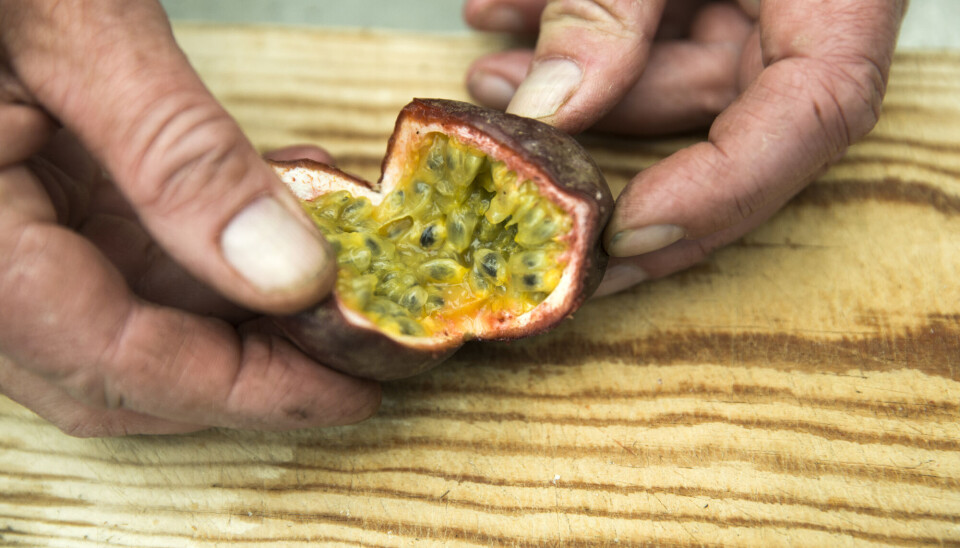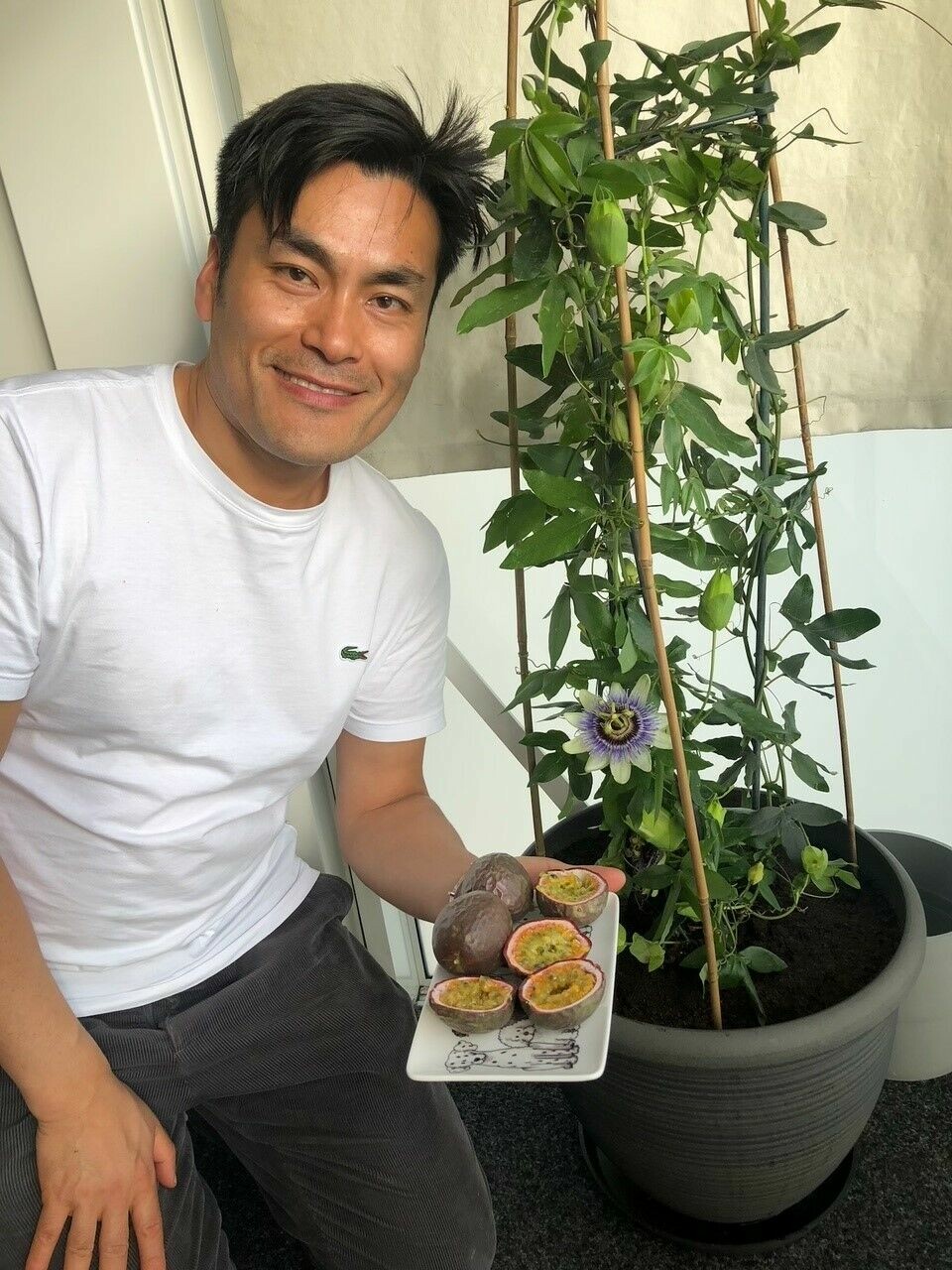
Passion fruit may slow down Alzheimer's
Passion fruit can reduce memory loss and slow down disease development in Alzheimer animal models, a new Norwegian study finds.
The study finds that extracts from the exotic fruit can improve some of the symptoms of Alzheimer’s disease in animal models, according to a press release from Akershus University Hospital (link in Norwegian).
The experiments were done on human cells in the laboratory as well as in animal models for Alzheimer’s.
Weakened ageing cells
“There are many theories as to what is the origin of dementia and Alzheimer’s disease, but one of the most interesting ones is the theory that the cells in our bodies can get ‘tired’ when we age, and that this makes it difficult for them to work efficiently”, says Evandro F. Fang, who has led the study.
Fang is associate professor at the Department of Clinical Molecular Biology at the University of Oslo and the Akershus University Hospital and heads the Evandro Fei Fang Lab.
The reason for the cells tiring, may be found in a part of the cells which are called mitochondria. Mitochondria are responsible for supplying our cells with energy. Fang likens it to the engine of a garbage truck. With normal function, cells make sure they remove old or destroyed parts, like rubbish clearance by a garbage truck, and thus keep the mitochondria and other parts of the cells healthy.
But if the mitochondria are worn out, damaged, or even stop to work during ageing, this can turn into a vicious circle with increased failure both in energy production and repair.
“Our earlier studies have shown that damaged mitochondria in Alzheimer’s patients are a bit like a rusty garbage truck: they slow down the cells normal cleaning services, which causes cellular waste to pile up,” Fang explains.
This in turn accelerates the development of Alzheimer’s disease.

Exotic fruit to the rescue
For almost five years, Fang’s team of researchers have been searching for a molecule in nature that can slow down or limit the development of Alzheimer’s, by strengthening the cleaning process in the cells.
The search has centered on colourful and exotic fruits. The reason for why the team has examined passion fruit, is the fact that the fruit is a large source of so-called phytochemicals. These are chemical compounds produced by plants to help them resist things like fungi and bacteria, that may also affect the workings of the human body.
“Clinical studies involving humans should now be done in order to reveal whether or not it might be useful to develop passion fruit extract as preventive medicine against Alzheimer’s disease,” Fang says in the press release.
The fresh passion fruit used in the study was collected from Chiang Mai in Thailand. It was cut and air-dried, and then ground into a fine powder.
A problem of patents
The road from this discovery to a potential medication is long – at the very least 10-15 years.
Just to complicate matters more, a researcher in South Korea patented the molecules that the Fang lab has done research on in the early 2000s. This is blocking Fang and his team from patenting their discovery – which is necessary in order to attract funding to develop medications.
“We are now using artificial intelligence to modify the structure a little bit so we get a new compound with the same activity that we can patent,” Fang says to sciencenorway.no.
Do eat more colourful fruits!
In the meantime, should we all start eating more passion fruit then?
Sure, Fang says.
“Passion fruit has been eaten in countries like Thailand and China for hundreds of years. They eat it as a snack, maybe as many as ten or more a day. It may not benefit you – but it won’t be toxic,” he says.
According to Fang, epidemiological investigations have found that people who eat colourful fruits, including passion fruit, have a relatively low chance of getting dementia. They also have better brain health.
Speaking to sciencenorway.no over the phone from today’s home office, Fang shares that he is looking straight at a large bowl of fruits. And he has a passion fruit plant on his balcony.
“I eat pomegranates and passion fruits, grapes and Norwegian berries,” he says.
Being an anti-ageing researcher however, he stresses that there is no one single solution to the challenges of an ageing body.
“It’s all about a combination of different things. A healthy diet, active exercise, and good psychological health, family, relationships,” he says.

A good first step
Asgeir Kobro-Flatmoen does basic research at the K.G. Jebsen Center for Alzheimer's Disease at the Kavli Institute for Systems Neuroscience. He spends his days trying to understand in exactly which cells the disease first develops.
Kobro-Flatmoen says the study from the Fang lab is exciting.
“It’s important that we do high quality studies of components that are readily available and see if they might have an effect on Alzheimer’s,” he says.
“This is research on a basic level, and we can’t conclude that we’ve found a preventive treatment – this is important to bear in mind. But it’s a well-executed study with very interesting results,” he says.
Kobro-Flatmoen will however not start eating passion fruits just yet.
“One of the challenges here is that there is a lot of research on food and other components that might be able to prevent Alzheimer’s, lots of plant extracts and tea leaves and what have you. What we need are studies that confirm the results – that’s when things start getting really interesting,” he says.
Add to that the fact that our brains are almost incomprehensibly complex, with 80 billion neurons and ten times the number of other cells.
“One component can be good for one thing, and bad for another. We see this all the time,” says Kobro-Flatmoen.
“But again, this is an exciting first step, and it is valuable research – even if it turns out to not be confirmed in later studies. This is what research is all about, we need heaps of studies in order to narrow down what actually works,” he says.
Reference:
Cao, Shu-qin et al, P. edulis Extract Protects Against Amyloid-β Toxicity in Alzheimer’s Disease Models Through Maintenance of Mitochondrial Homeostasis via the FOXO3/DAF-16 Pathway, Molecular Neurobiology (2022), Abstract, Full text
































